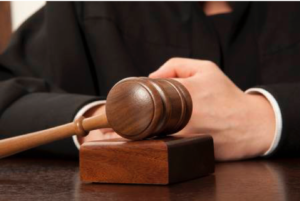By Samuel D. Gilleran
Robert F. Chapman was born April 24, 1926, in Inman, South Carolina.[1] Judge Chapman joined the U.S. Navy during World War II, while completing his B.S. at the University of South Carolina.[2] After the conclusion of the war, he attended law school at the University of South Carolina, receiving his LL.B. in 1949.[3] At South Carolina, he was a member of the Order of the Coif.[4] After graduating from South Carolina, he was in private practice in Spartanburg, South Carolina, for two years before being recalled for another stint in the Navy.[5] After his return, he continued his practice for nearly twenty years.[6] During that time, he was active in the Republican Party, serving as state chairman of the South Carolina GOP from 1961 to 1963.[7]
On May 18, 1971, he was appointed to the District Court for the District of South Carolina by President Richard M. Nixon; he was confirmed later that month and received his commission on May 27, 1971.[8] While serving as a district court judge, he received the Order of the Palmetto, South Carolina’s highest civilian honor, given to its outstanding citizens to recognize significant achievements.[9]
On July 16, 1981, President Ronald Reagan appointed Judge Chapman to the Fourth Circuit Court of Appeals.[10] He was confirmed by the Senate on September 16, 1981, and he received his commission on September 19, 1981.[11] Judge Chapman took senior status on May 31, 1991, and he died on April 18, 2018.[12]
One of the more interesting cases that Judge Chapman presided over was Ryan v. Eli Lilly & Co.,[13] involving a DES (synthetic estrogen) claim. The plaintiff’s mother, some twenty-eight years earlier, had been prescribed DES while she was pregnant with plaintiff on the theory that it would prevent miscarriage; but it was later discovered that the children in utero at the time DES was ingested were at a higher risk for cancer. Judge Chapman held that because the plaintiff could not identify the manufacturer of the DES, she could not establish causation-in-fact for any one defendant, so the defendant drug companies were entitled to summary judgment.[14] In so ruling, he rejected alternative theories of tort liability that some courts had adopted in DES cases, including alternative liability and market-share liability.[15]
Judge Chapman also presided over Bob Jones University v. United States,[16] in which the fundamentalist college contested the IRS’s revocation of its tax-exempt status. At the time, Bob Jones had racially discriminatory practices, including forbidding its students to date or marry outside of their race.[17] Judge Chapman ruled that revoking the university’s tax-exempt status in response to its genuinely-held religious beliefs was a violation of the First Amendment.[18] The dispute eventually made its way to the Supreme Court, and the Supreme Court held against Bob Jones, ruling that the government had a “compelling” interest in eradicating racial discrimination,[19] and that “[i]t would be wholly incompatible with the concepts underlying tax exemption to grant the benefit of tax-exempt status to racially discriminatory educational entities.”[20]
Judge J. Harvey Wilkinson III of the Fourth Circuit described Judge Chapman as “unmoved by flattery and impervious to applause.”[21] Judge Wilkinson went on to say that Judge Chapman was “appreciated” by all his colleagues and “held in the highest respect” by both his fellow judges and the attorneys who practiced before him.[22] According to Judge Wilkinson, Judge Chapman “had as much common sense as any judge I have known.”[23] Judge Chapman was remembered as a generous man, and his family is the sponsor of the Chapman Cultural Center in Spartanburg, South Carolina.[24] One longtime friend said that Judge Chapman “personified the definition of being a gentleman.”[25] The College of Charleston conferred upon him an honorary doctorate in 2000.[26] He also served as an elder at the First Presbyterian Church of Spartanburg and Bethesda Presbyterian Church in Camden, South Carolina.[27]
[1] Chapman, Robert Foster, Fed. Judicial Ctr., https://www.fjc.gov/history/judges/chapman-robert-foster (last visited Nov. 12, 2018).
[2] Id.
[3] Id.
[4] Court Mourns the Loss of Judge Robert F. Chapman, U.S. Court of Appeals for the Fourth Circuit (Apr. 26, 2018), http://www.ca4.uscourts.gov/news-announcements/latest-news-announcements/2018/04/26/court-mourns-the-loss-of-judge-robert-f.-chapman.
[5] Id.
[6] Fed. Judicial Ctr., supra note 1.
[7] Bob Montgomery, Judge Robert Foster Chapman Remembered as a “True Gentleman”, GoUpstate.com (Apr. 25, 2018, 7:00 PM), https://www.goupstate.com/news/20180425/judge-robert-foster-chapman-remembered-as-true-gentleman.
[8] Fed. Judicial Ctr., supra note 1.
[9] U.S. Court of Appeals for the Fourth Circuit, supra note 4.
[10] Id.
[11] Fed. Judicial Ctr., supra note 1.
[12] Id.
[13] 514 F. Supp. 1004 (D.S.C. 1981)
[14] Id. at 1006–08.
[15] Id. at 1016–18.
[16] 468 F. Supp. 890 (D.S.C. 1978)
[17] Id. at 895.
[18] Id. at 907.
[19] Bob Jones Univ. v. U.S., 461 U.S. 574, 604 (1983).
[20] Id. at 595.
[21] U.S. Court of Appeals for the Fourth Circuit, supra note 4.
[22] Id.
[23] Id.
[24] Montgomery, supra note 7.
[25] Id.
[26] U.S. Court of Appeals for the Fourth Circuit, supra note 4.
[27] Montgomery, supra note 7.






